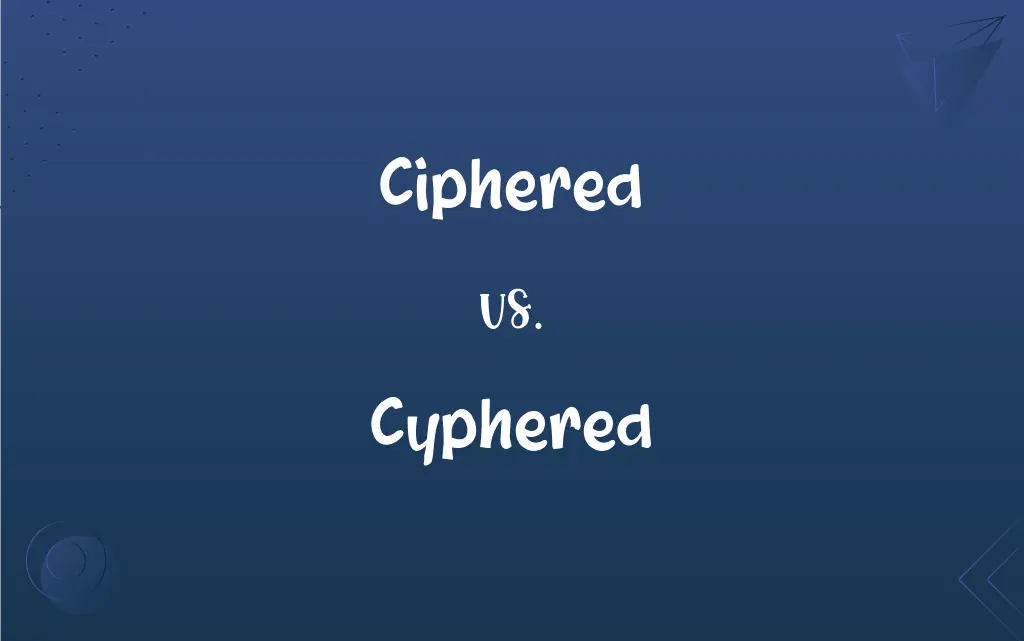Ciphered vs. Cyphered: What's the Difference?
By Janet White & Harlon Moss || Updated on March 4, 2024
"Ciphered" and "cyphered" are variant spellings of the same concept, referring to the process of converting plain text into a coded form using a cipher. Both terms are used interchangeably to describe the act of encrypting information.

Key Differences
The terms "ciphered" and "cyphered" both relate to the use of ciphers, which are methods or systems for disguising a message by replacing or rearranging its characters so that it can only be read by someone who knows the secret method of deciphering it. The process involves transforming readable information (plain text) into an unreadable format (cipher text) to secure its contents from unauthorized access or to maintain its confidentiality during transmission.
Historically, ciphers have been used in various forms, from simple substitution and transposition ciphers to more complex encryption algorithms used in modern digital communications. The choice between "ciphered" and "cyphered" largely comes down to regional spelling preferences and the context in which the term is used. However, "ciphered" is more commonly found in contemporary usage and technical literature related to cryptography and information security.
The act of encrypting information serves multiple purposes, including ensuring the privacy of communication, protecting sensitive data, and securing transactions over the Internet. Both "ciphered" and "cyphered" encapsulate this concept of encryption, emphasizing the transformation of information to protect it from being understood by unintended recipients.
There is no difference in meaning between "ciphered" and "cyphered," the former is the more widely accepted and used spelling in the context of cryptography and information security. The evolution of ciphers from simple manual systems to complex algorithmic processes reflects the growing importance of information security in a digitally connected world.
Comparison Chart
Definition
The act of converting plain text into coded form using a cipher.
The act of converting plain text into coded form using a cipher (alternative spelling).
ADVERTISEMENT
Usage
More commonly used in modern cryptography and information security.
Less commonly used, but understood in the same context as "ciphered".
Context
Used across various applications, including digital communications, data encryption, and historical cryptography.
Same as "ciphered", with no difference in application or context.
Spelling
Preferred spelling in contemporary literature and technical documents.
Variant spelling, less prevalent in formal writing.
Purpose
To secure information, ensuring confidentiality and integrity.
Identical to "ciphered", aiming to protect information from unauthorized access.
Ciphered and Cyphered Definitions
Ciphered
Transforming information into a secret code.
Sensitive data is ciphered before transmission.
ADVERTISEMENT
Cyphered
Used interchangeably with "ciphered" in encryption contexts.
The diary entries were cyphered to keep them private.
Ciphered
Integral to modern information security practices.
Online banking transactions are ciphered for security.
Cyphered
Alternative spelling for encrypted communication.
Ancient manuscripts were sometimes cyphered to hide knowledge.
Ciphered
Applied in securing digital communications.
Emails are often ciphered to protect privacy.
Cyphered
Reflects the same process of securing information.
Personal information is cyphered on secure websites.
Ciphered
Encrypted using a specific method.
The message was ciphered using a Caesar cipher.
Cyphered
Variant of cipher.
Ciphered
Historical use in wartime communications.
Military commands were ciphered to prevent enemy interception.
Cyphered
The mathematical symbol (0) denoting absence of quantity; zero.
Ciphered
The mathematical symbol (0) denoting absence of quantity; zero.
Cyphered
An Arabic numeral or figure; a number.
Ciphered
An Arabic numeral or figure; a number.
Cyphered
One having no influence or value; a nonentity.
Ciphered
One having no influence or value; a nonentity.
Cyphered
A cryptographic system in which units of text of regular length, usually letters, are transposed or substituted according to a predetermined code.
Ciphered
A cryptographic system in which units of text of regular length, usually letters, are transposed or substituted according to a predetermined code.
Cyphered
The key to such a system.
Ciphered
The key to such a system.
Cyphered
A message written or transmitted in such a system.
Ciphered
A message written or transmitted in such a system.
Cyphered
A design combining or interweaving letters or initials; a monogram.
Ciphered
A design combining or interweaving letters or initials; a monogram.
Cyphered
To solve problems in arithmetic; calculate.
Ciphered
To solve problems in arithmetic; calculate.
Cyphered
To put in secret writing; encode.
Ciphered
To put in secret writing; encode.
Cyphered
To solve by means of arithmetic.
Ciphered
To solve by means of arithmetic.
Cyphered
Simple past tense and past participle of cypher
Ciphered
Simple past tense and past participle of cipher
Cyphered
Found in discussions on cryptography history.
Spy networks often cyphered their messages to avoid detection.
Cyphered
Occasionally seen in literature and colloquial use.
The secret formula was cyphered to protect the invention.
FAQs
Are "ciphered" and "cyphered" the same?
Yes, "ciphered" and "cyphered" refer to the same process of encrypting information using a cipher, differing only in spelling.
Which spelling should I use, "ciphered" or "cyphered"?
"Ciphered" is the more commonly accepted and used spelling, especially in formal writing and technical contexts related to cryptography.
Can anything be ciphered or cyphered?
In theory, any form of readable information can be ciphered or cyphered, as long as there is a method or system in place for encrypting and subsequently decrypting it.
How do I choose a method to cipher information?
Choosing a method to cipher information depends on the level of security needed, the nature of the information, and the resources available for encryption and decryption.
Are modern encryption methods considered ciphers?
Yes, modern encryption methods, including symmetric and asymmetric algorithms, are considered ciphers and are part of the broader field of cryptography.
How has the use of ciphers evolved over time?
The use of ciphers has evolved from simple manual techniques for secret communication to complex mathematical algorithms that secure digital data and communications on a global scale.
What is the difference between encrypting and ciphering?
Encrypting and ciphering are often used interchangeably in the context of transforming readable data into an unreadable format. However, encrypting is a broader term that encompasses the use of both ciphers and more complex algorithms for securing data.
Are there any free tools for ciphering or deciphering messages?
Yes, there are many free tools and software available that offer ciphering and deciphering capabilities for educational, personal, or professional use, such as GPG for email encryption.
Is it possible to decipher or decypher information without the key?
Deciphering or decyphering information without the key is extremely difficult, especially with strong encryption methods, and usually requires advanced cryptanalysis or brute force attacks.
Can ciphered information be completely secure?
While ciphering significantly increases the security of information, no encryption method is entirely foolproof, especially considering potential vulnerabilities in implementation or advancements in cryptanalysis.
Do all countries use the same encryption standards?
While there are widely accepted encryption standards, such as AES and RSA, different countries or organizations may implement or mandate different standards based on their specific security requirements.
Can ciphered data be legally intercepted or accessed?
Ciphered data can be legally intercepted or accessed if authorized by law, such as through court orders or in accordance with laws governing surveillance and data access for security purposes.
How do companies ensure their ciphering methods are secure?
Companies ensure their ciphering methods are secure by adhering to industry standards, undergoing regular security audits, and updating their encryption practices in response to new vulnerabilities and advances in cryptanalysis.
What impact does quantum computing have on ciphering methods?
Quantum computing poses a potential threat to current ciphering methods, as it could eventually break many of the cryptographic algorithms that secure digital communications today. Researchers are working on quantum-resistant cryptography to address this challenge.
Can ciphered messages be considered completely anonymous?
While ciphering can protect the content of messages, anonymity also requires hiding who is communicating. Additional techniques, such as using anonymous networks, are necessary for complete anonymity.
How does one choose a ciphering method for sensitive information?
Choosing a ciphering method for sensitive information involves considering the level of security required, the type of data, the potential threats, and compliance with legal and industry standards. Consulting with cybersecurity experts is also advisable to make an informed decision.
How important is ciphering in today's digital world?
Ciphering is crucial in today's digital world for protecting privacy, securing communications, and ensuring the integrity and confidentiality of data transmitted over the Internet.
How do ciphers contribute to internet security?
Ciphers are fundamental to internet security, encrypting data in transit (e.g., during online transactions or communications) to protect it from interception, tampering, and unauthorized access.
How do I learn about different ciphering techniques?
Learning about different ciphering techniques can be achieved through online courses, cryptography textbooks, and practical workshops or tutorials that cover historical ciphers to modern encryption algorithms.
Is there a difference in the level of security between digital and manual ciphering methods?
Digital ciphering methods, especially those using advanced encryption algorithms, generally offer a higher level of security compared to manual methods, due to their complexity and the computational power required to break them.
About Author
Written by
Janet WhiteJanet White has been an esteemed writer and blogger for Difference Wiki. Holding a Master's degree in Science and Medical Journalism from the prestigious Boston University, she has consistently demonstrated her expertise and passion for her field. When she's not immersed in her work, Janet relishes her time exercising, delving into a good book, and cherishing moments with friends and family.
Co-written by
Harlon MossHarlon is a seasoned quality moderator and accomplished content writer for Difference Wiki. An alumnus of the prestigious University of California, he earned his degree in Computer Science. Leveraging his academic background, Harlon brings a meticulous and informed perspective to his work, ensuring content accuracy and excellence.































































